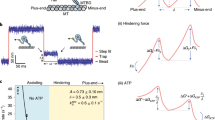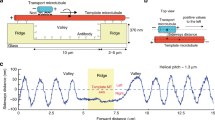Abstract
DYNAMIC changes in microtubule (MT) length have long been thought to contribute to intracellular motility1. Both the polymerization2 and depolymerization3–5 of tubulin have been shown to do work in vitro, but the biochemical complexity of objects moved, such as chromosomes, has complicated the identifi-cation of proteins that couple MT dynamics with motility. Work with MTs grown from and tethered to pellicles of lysed Tetrahymena has shown that disassembly-dependent movement of chromo-somes in vitro can be inhibited with antibodies against the motor domain of kinesin6. To study proteins that can function in disassembly-dependent motion, we have refined this motility assay, replacing chromosomes with protein-coated latex microspheres. We report here the ability of several enzymes, including kinesin, to support in vitro motility of latex microspheres on disassembling MTs (Fig. la). The polarity of kinesin's motor activity can be reversed by MT disassembly and interactions between a motor and a MT end can either slow or speed the rate of tubulin depolymerization.
This is a preview of subscription content, access via your institution
Access options
Subscribe to this journal
Receive 51 print issues and online access
$199.00 per year
only $3.90 per issue
Buy this article
- Purchase on Springer Link
- Instant access to full article PDF
Prices may be subject to local taxes which are calculated during checkout
Similar content being viewed by others
References
Inoue, S., J. Cell Biol. 91, 131s–147s (1981).
Miyamoto, H. & Hotani, H. Proc. Tanaguchi Int. Symp. 14, 220–242 (1988).
Koshland, D. E., Mitchison, T. J. & Kirschner, M. W. Nature 331, 499–504 (1988).
Coue, M., Lombillo, V. A. & McIntosh, J. R. J. Cell Biol. 112, 1165–1175 (1991).
Lombillo, V. A., Coue, M. & McIntosh, J. R. Meth. Cell Biol. 39, 148–165 (1993).
Lombillo, V. A., Nislow, C., Yen, T. J., Gelfand, V. I. & McIntosh, J. R. J. Cell Biol. (in the press).
Vale, R. D. et al. Cell 42, 39–50 (1985).
Vale, R. D., Soll, D. R. & Gibbons, I. R. Cell 59, 915–925 (1989).
Stewart, R. J. et al. Proc. natn. Acad. Sci. U.S.A. 90, 5209–5212 (1993).
Walker, R. A. et al. J. Cell Biol. 107, 1437–1448 (1988).
Vaisberg, G., Koonce, M. P. & McIntosh, J. R. J. Cell Biol. 123, 849–858 (1993).
Koonce, M. P. & McIntosh, J. R. Cell Motil. Cytoskel. 15, 51–62 (1990).
Porter, M. E. et al. J. biol. Chem. 263, 6759–6771 (1988).
Hollenbeck, P. J. J. Cell Biol. 108, 2335–2342 (1989).
Mandelkow, E. M., Milligan, R. & Mandelkow, E. J. Cell Biol. 114, 977–991 (1991).
Davis, A., Carleton, R. S., Dougherty, C. A. & Farrell, K. W. Science 264, 839–842 (1994).
Author information
Authors and Affiliations
Rights and permissions
About this article
Cite this article
Lombillo, V., Stewart, R. & Richard McIntosh, J. Minus-end-directed motion of kinesin–coated microspheres driven by microtubule depolymerization. Nature 373, 161–164 (1995). https://doi.org/10.1038/373161a0
Received:
Accepted:
Issue Date:
DOI: https://doi.org/10.1038/373161a0
This article is cited by
-
Measuring and modeling forces generated by microtubules
Biophysical Reviews (2023)
-
Kinesin expands and stabilizes the GDP-microtubule lattice
Nature Nanotechnology (2018)
-
Function and regulation of dynein in mitotic chromosome segregation
Chromosoma (2014)
-
The Ndc80 kinetochore complex forms oligomeric arrays along microtubules
Nature (2010)
-
Mechanisms of chromosome behaviour during mitosis
Nature Reviews Molecular Cell Biology (2010)
Comments
By submitting a comment you agree to abide by our Terms and Community Guidelines. If you find something abusive or that does not comply with our terms or guidelines please flag it as inappropriate.



